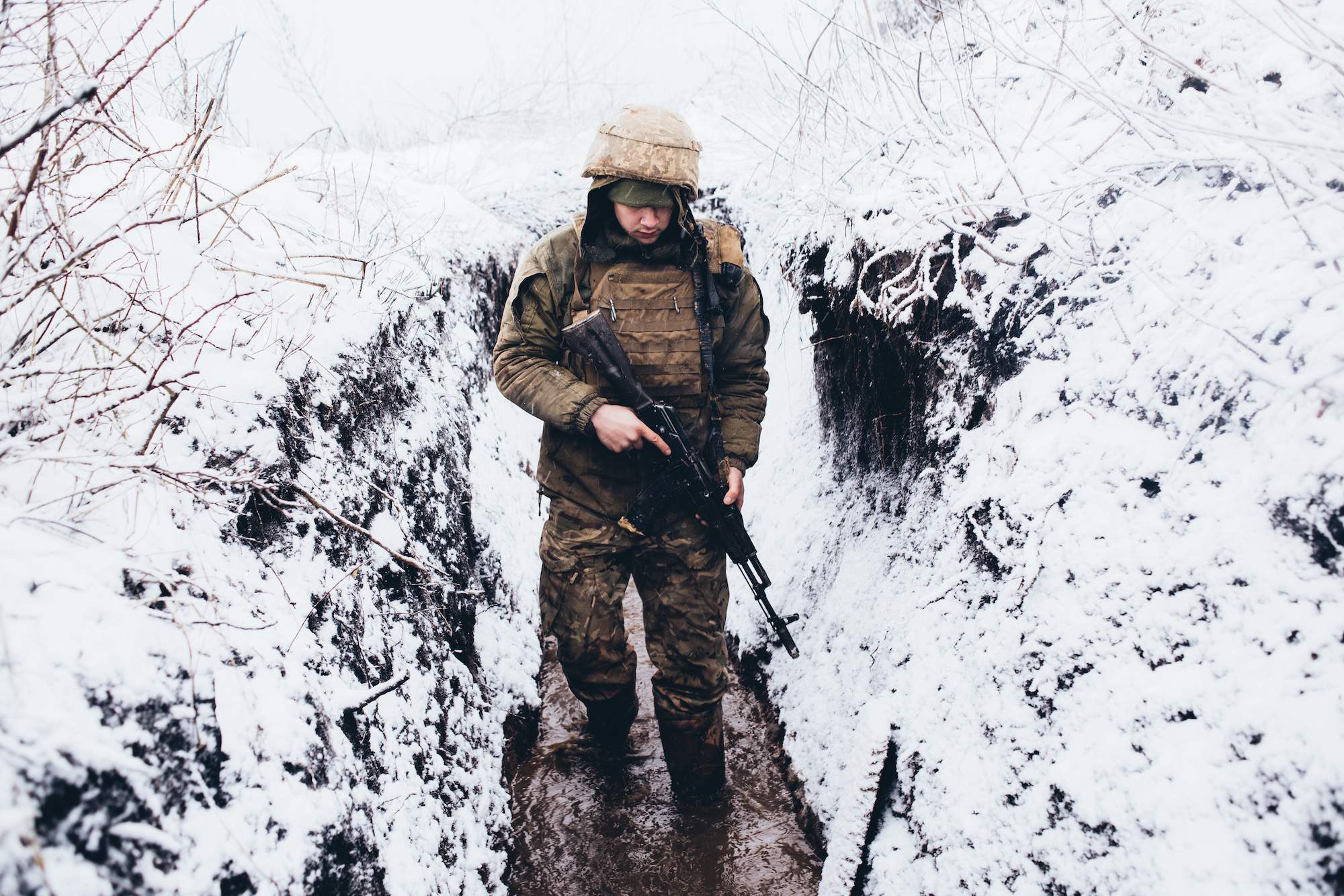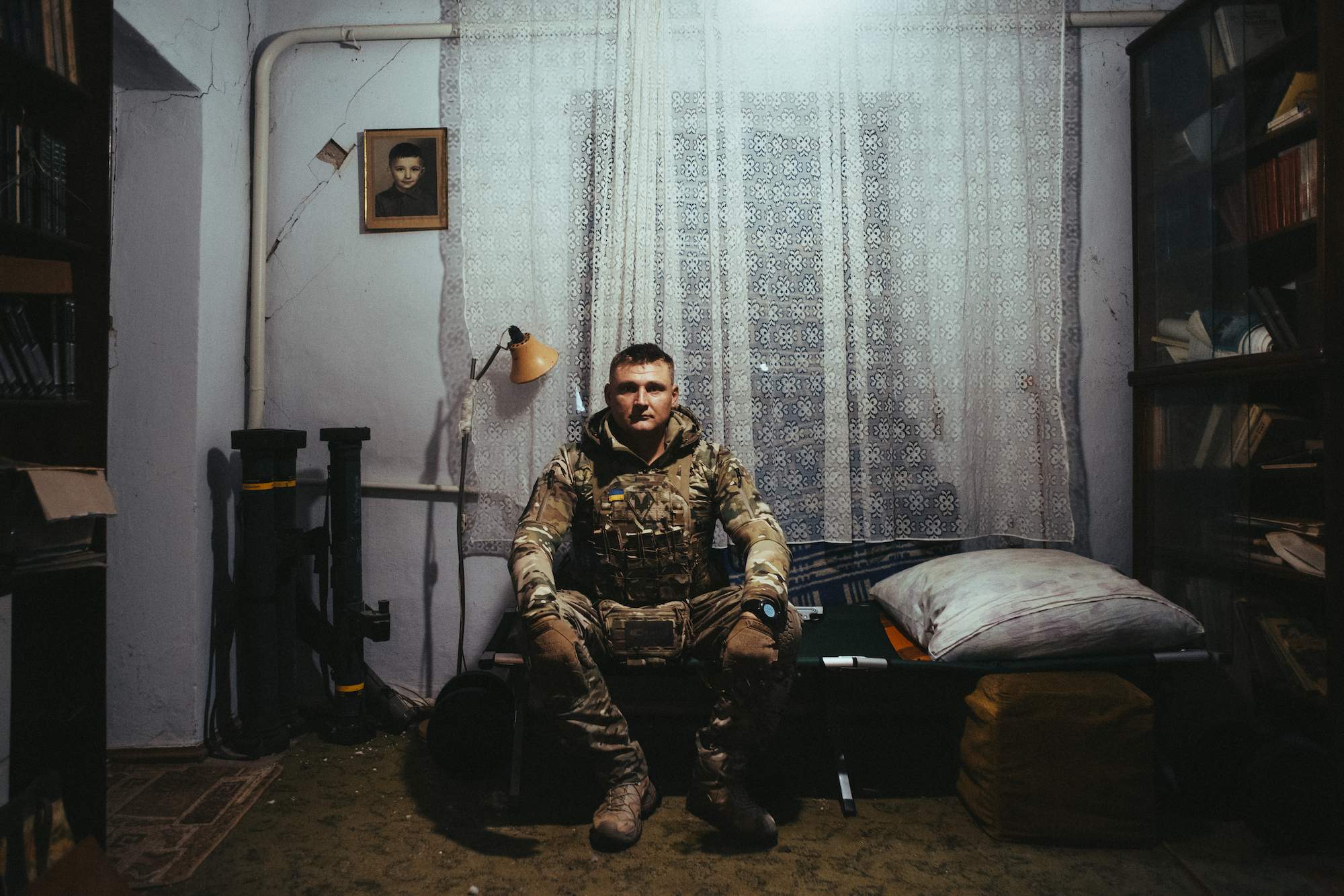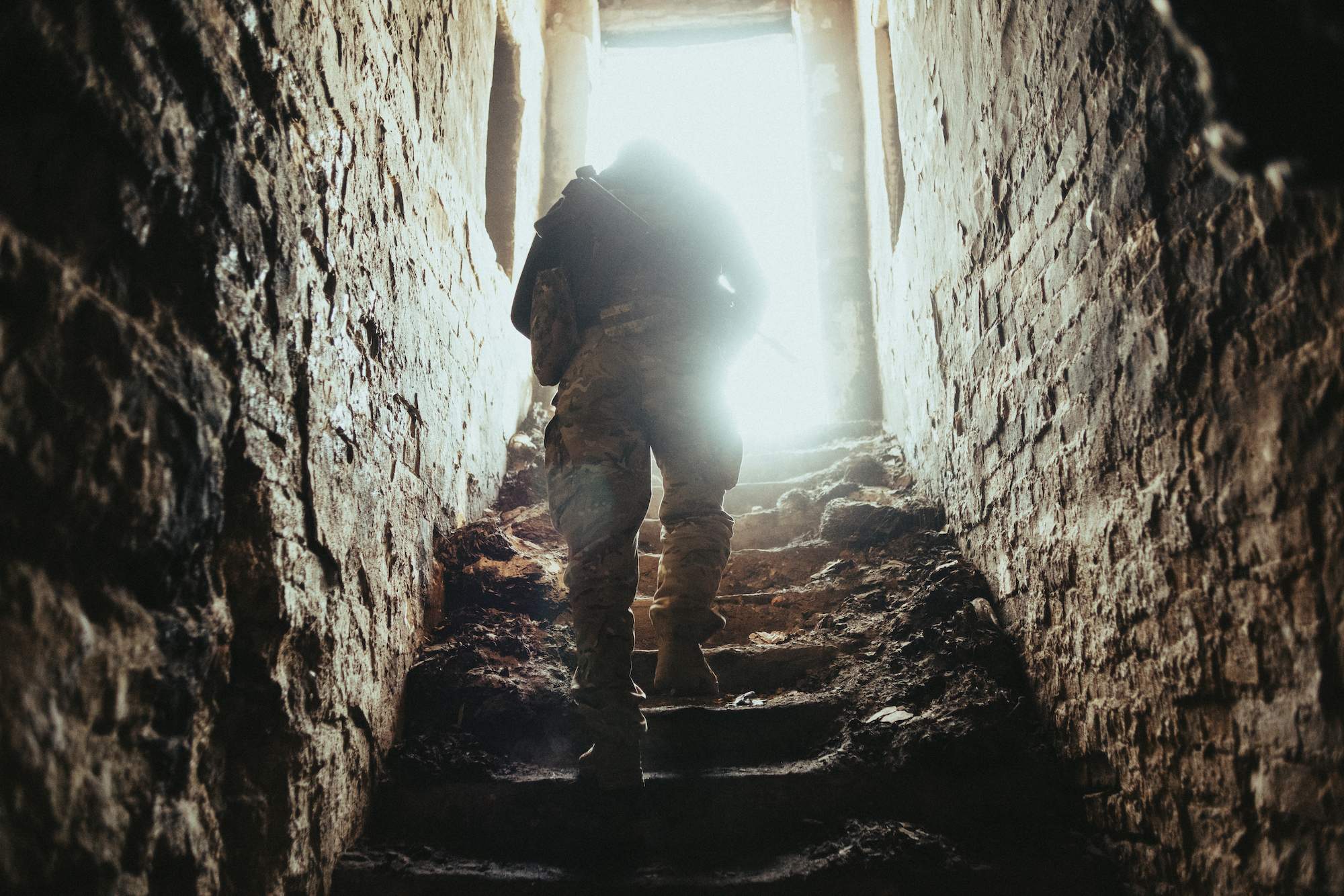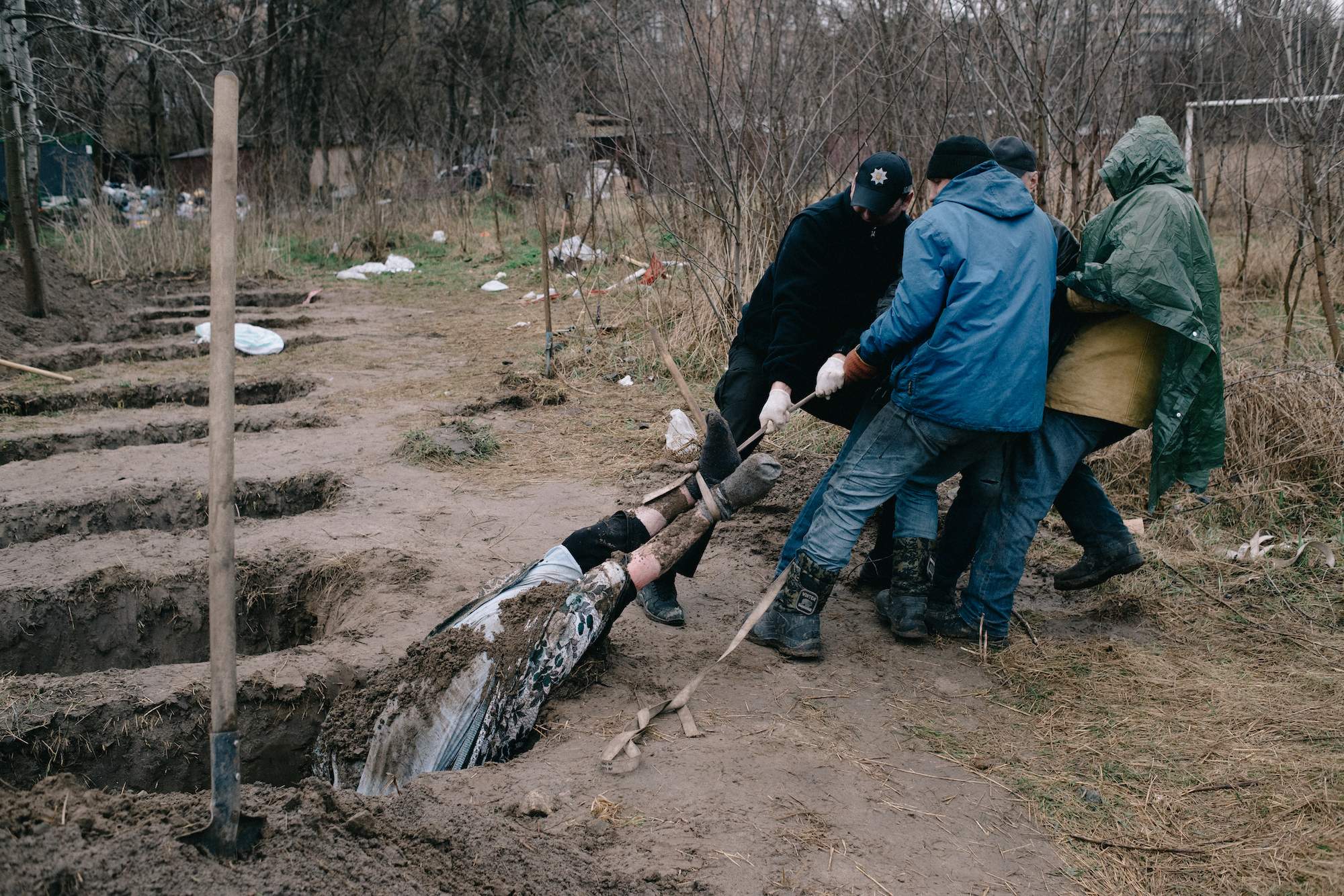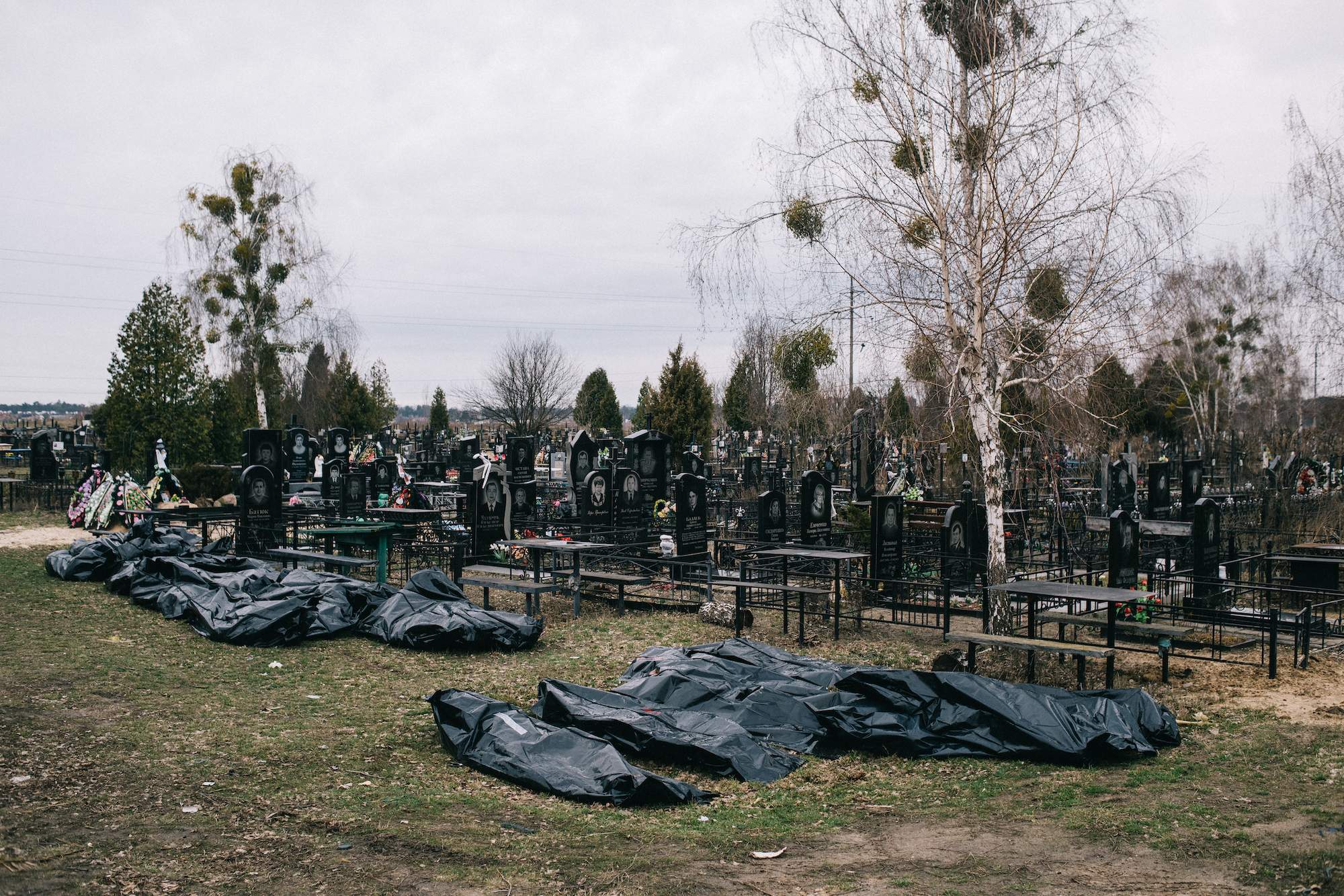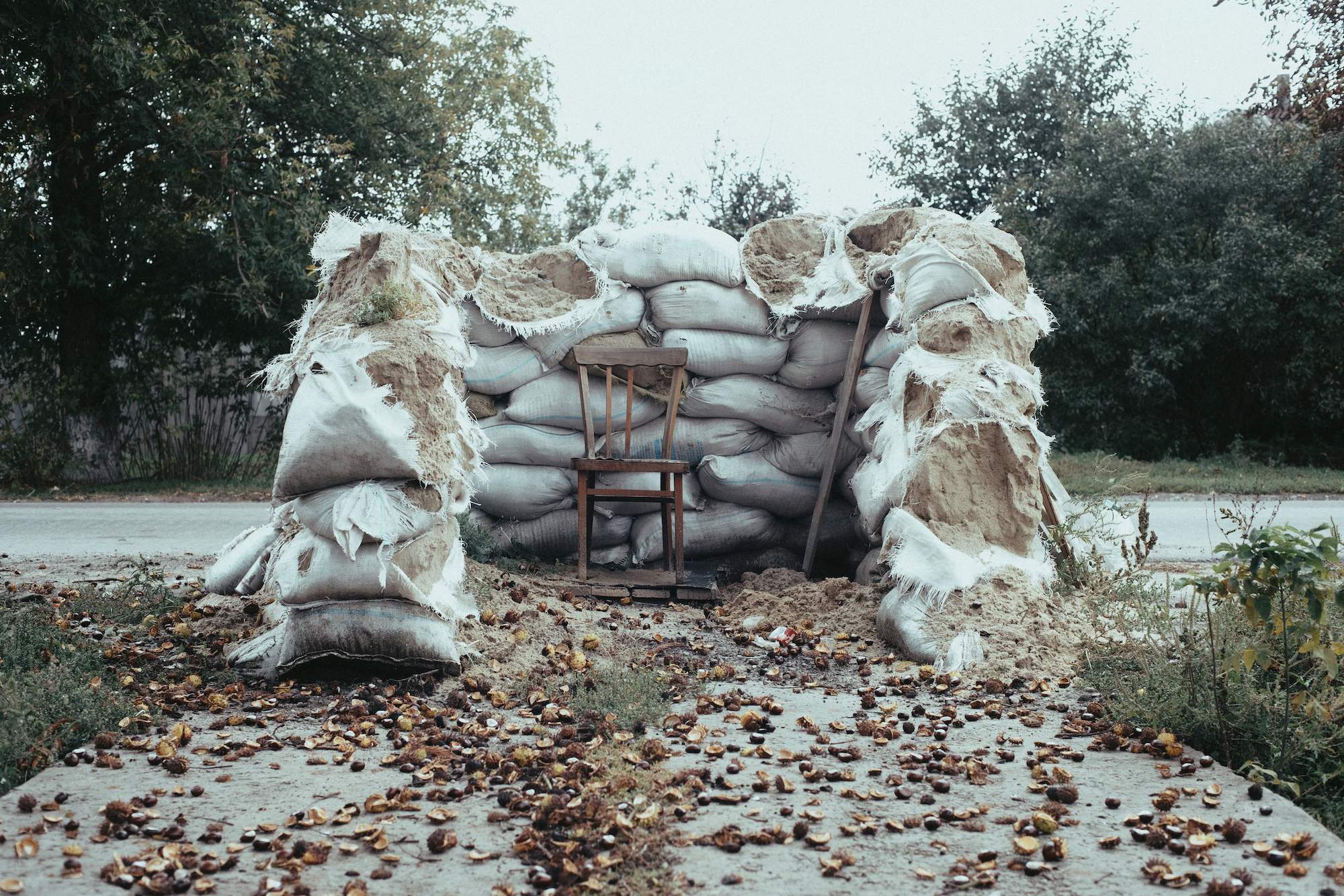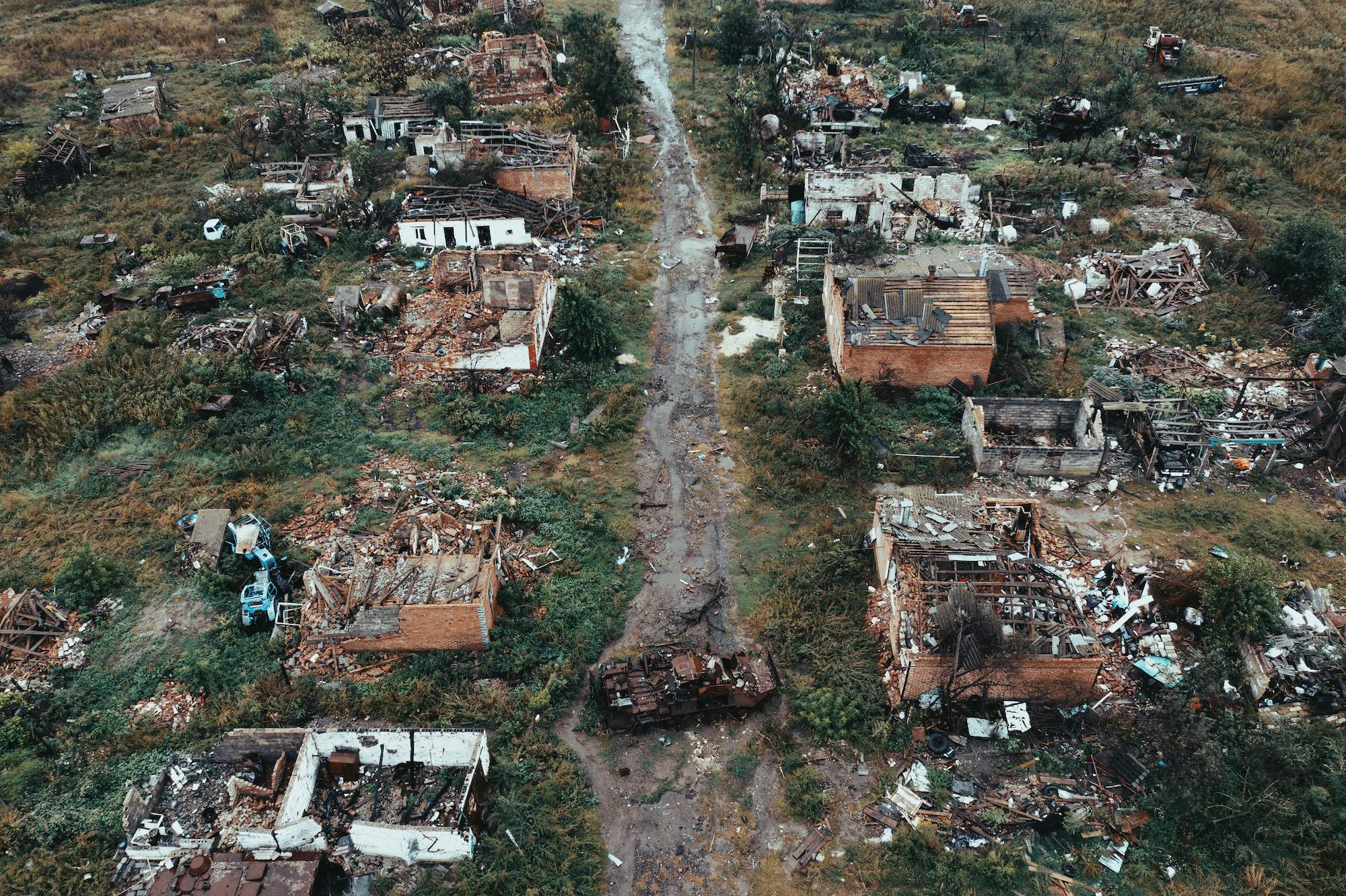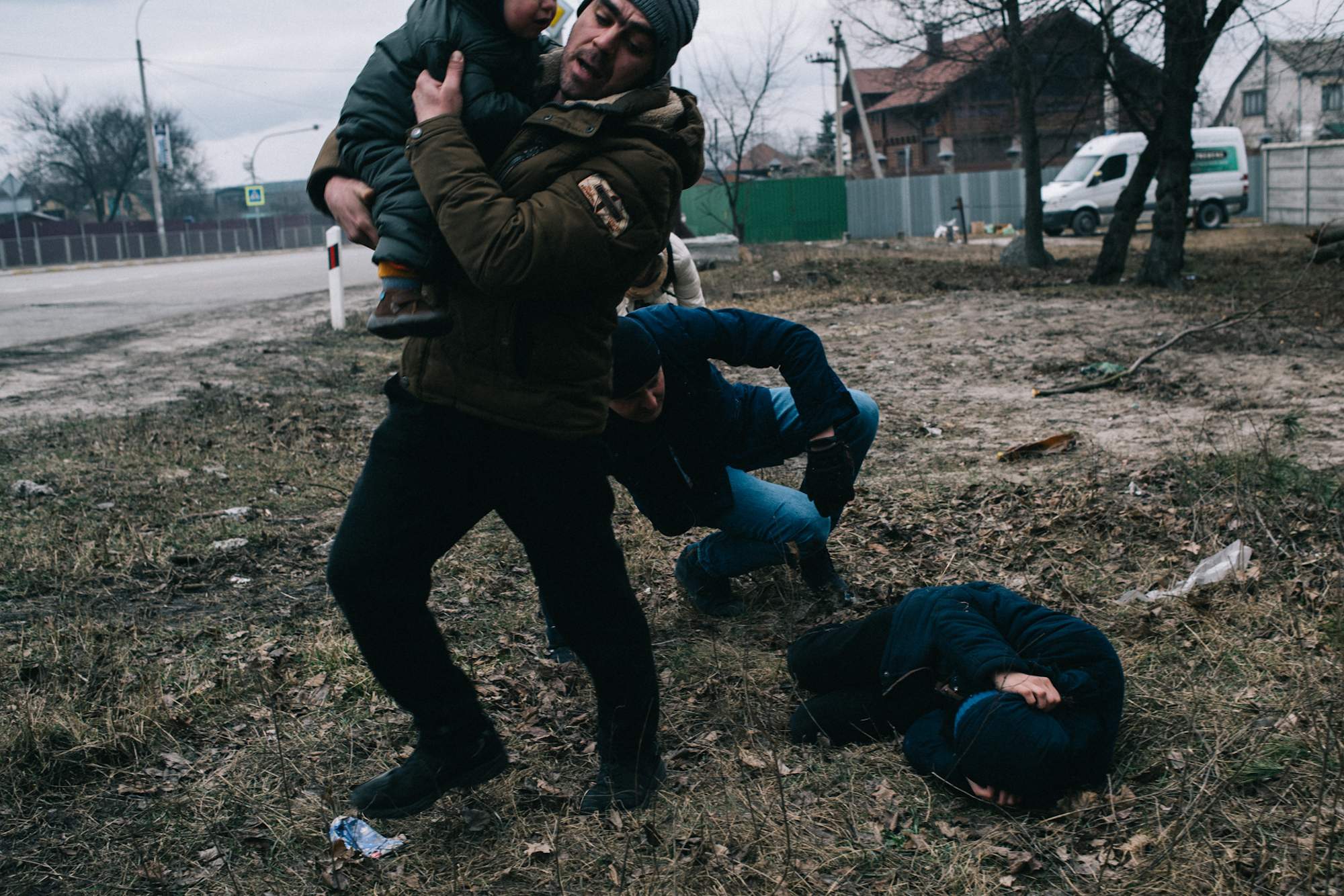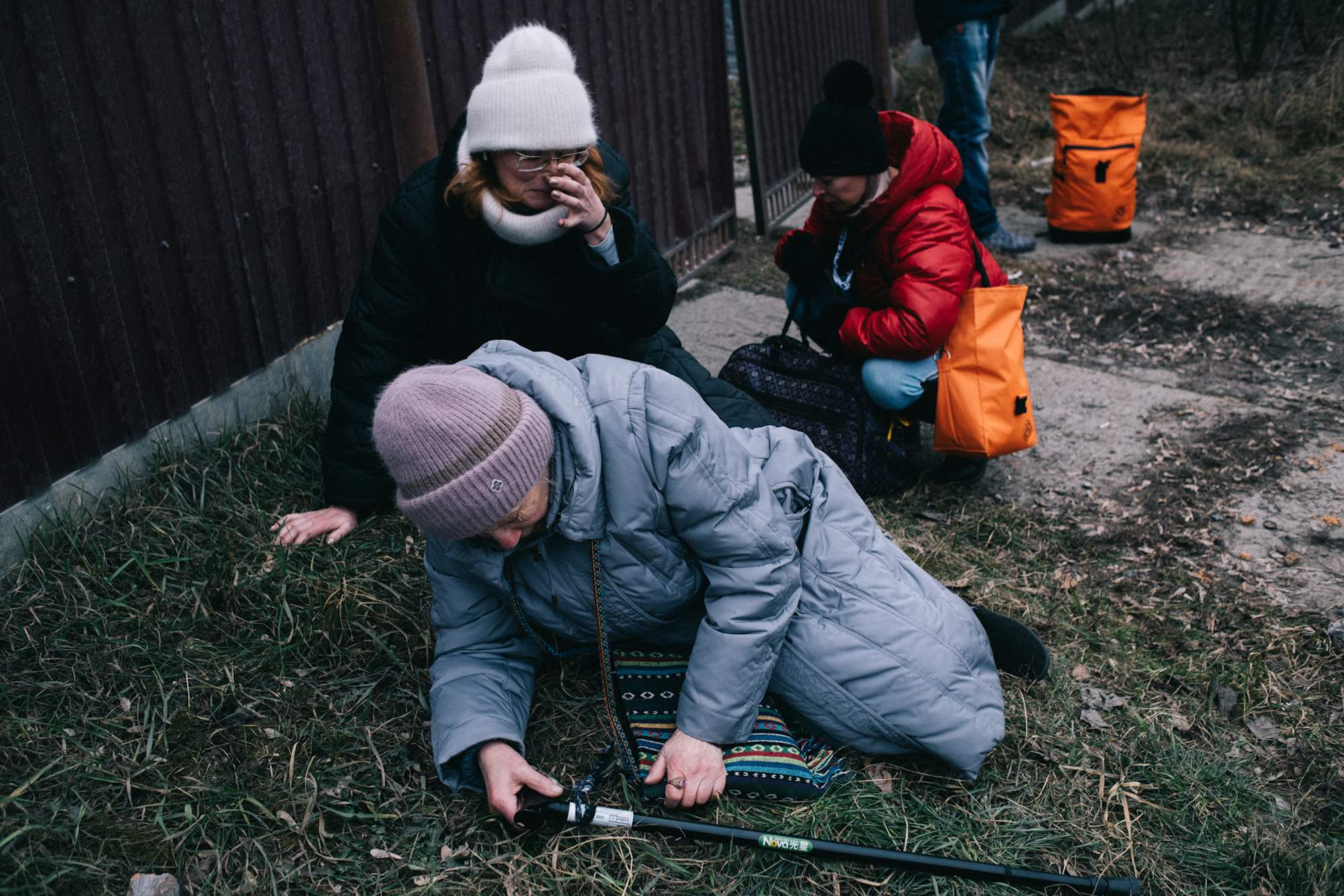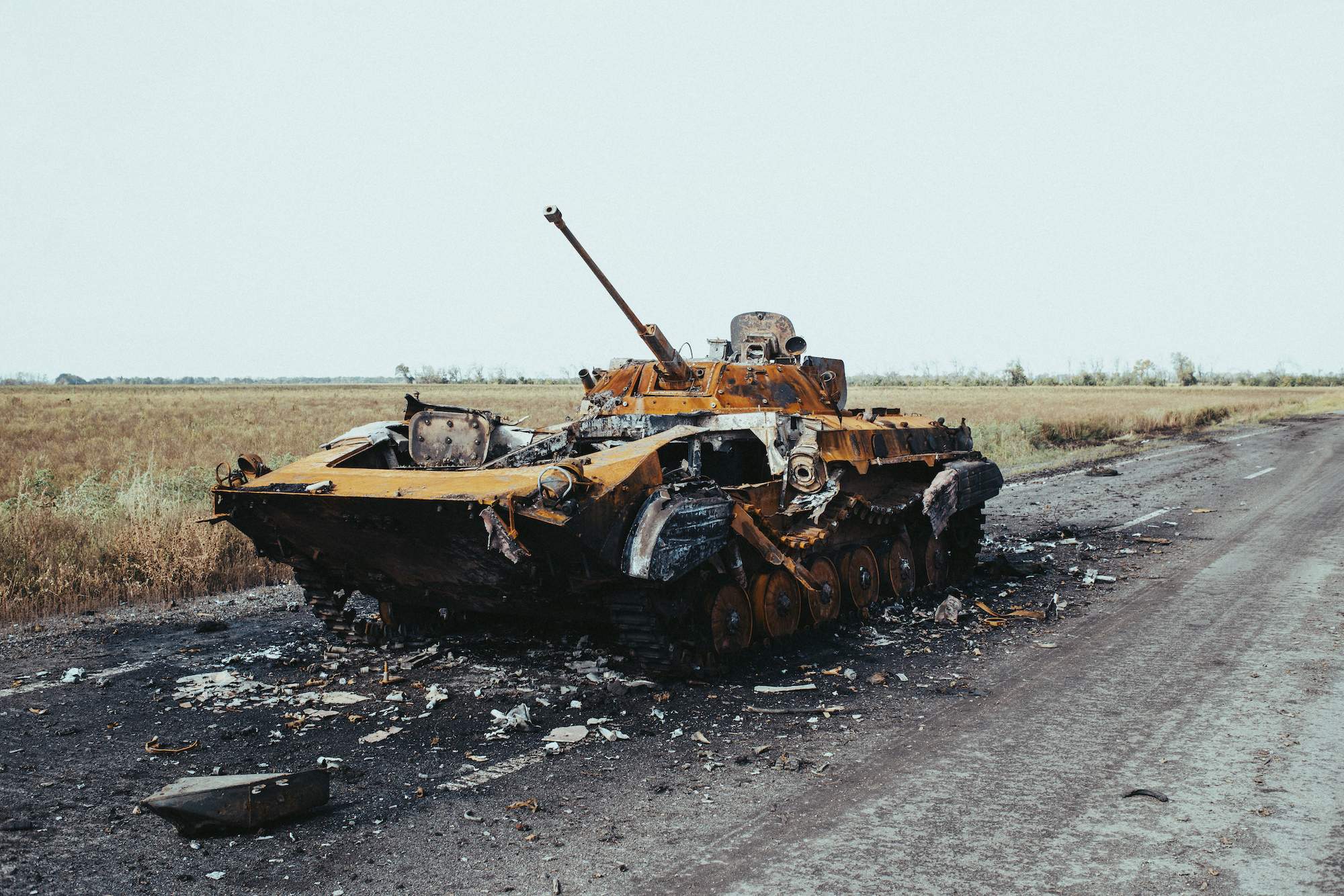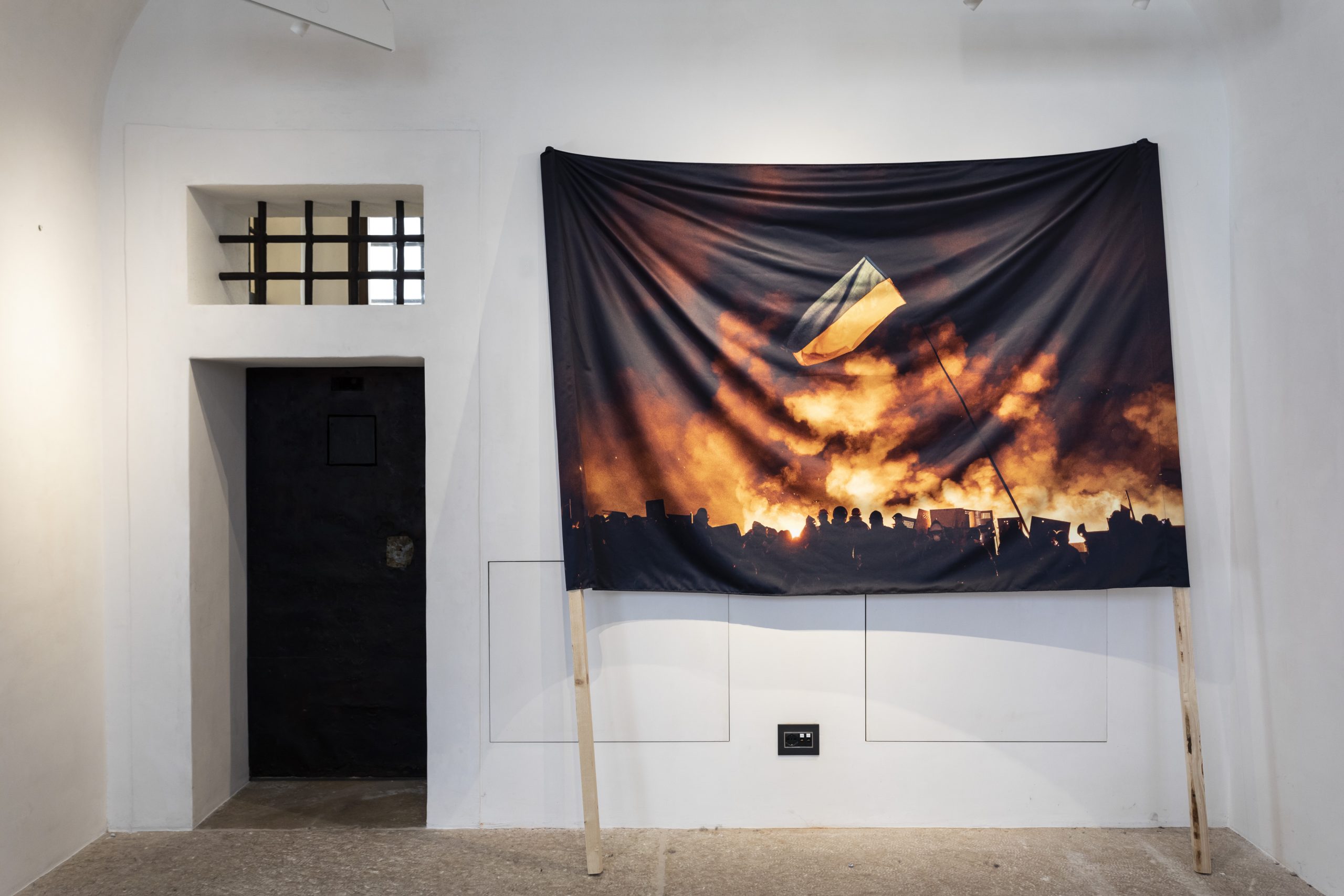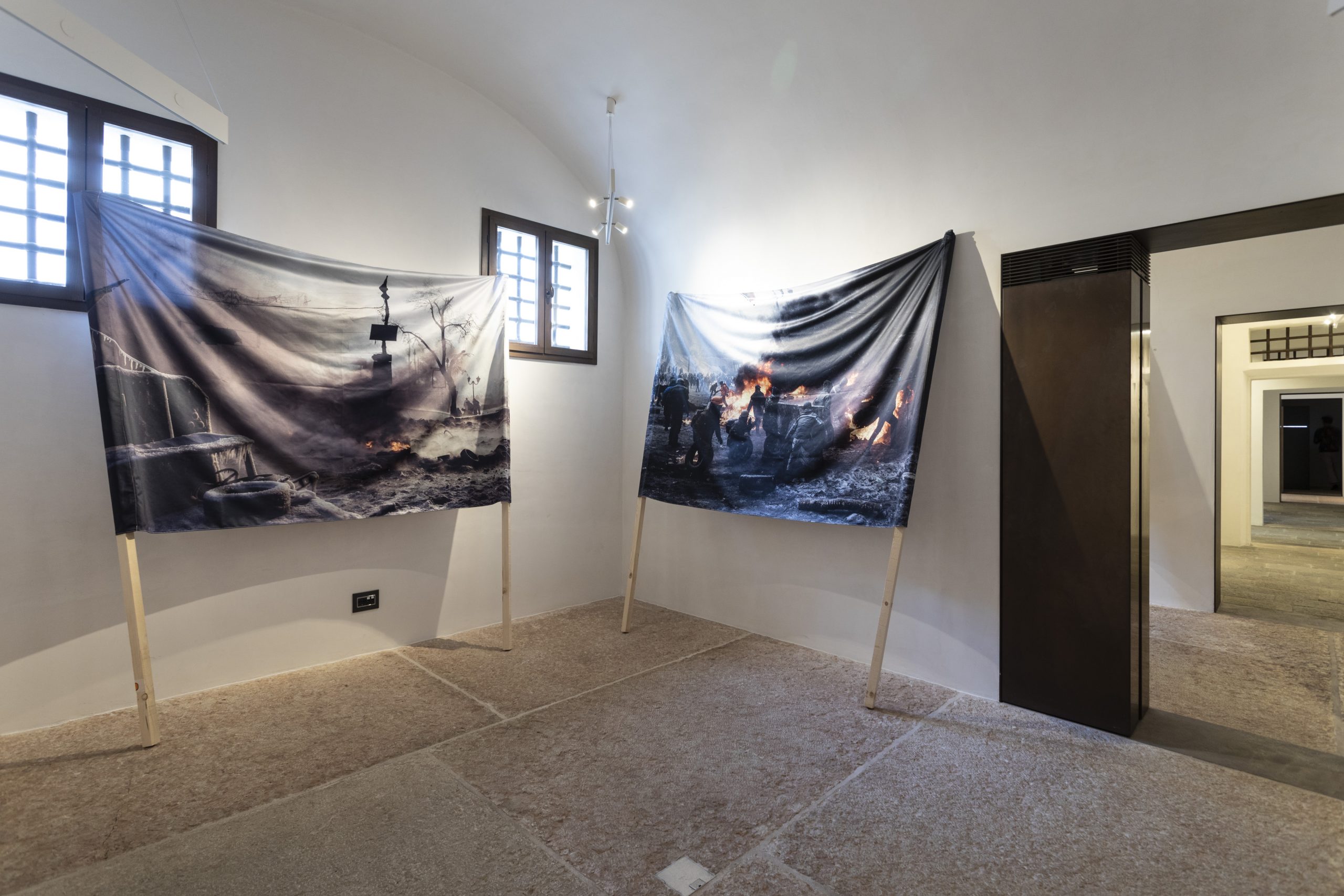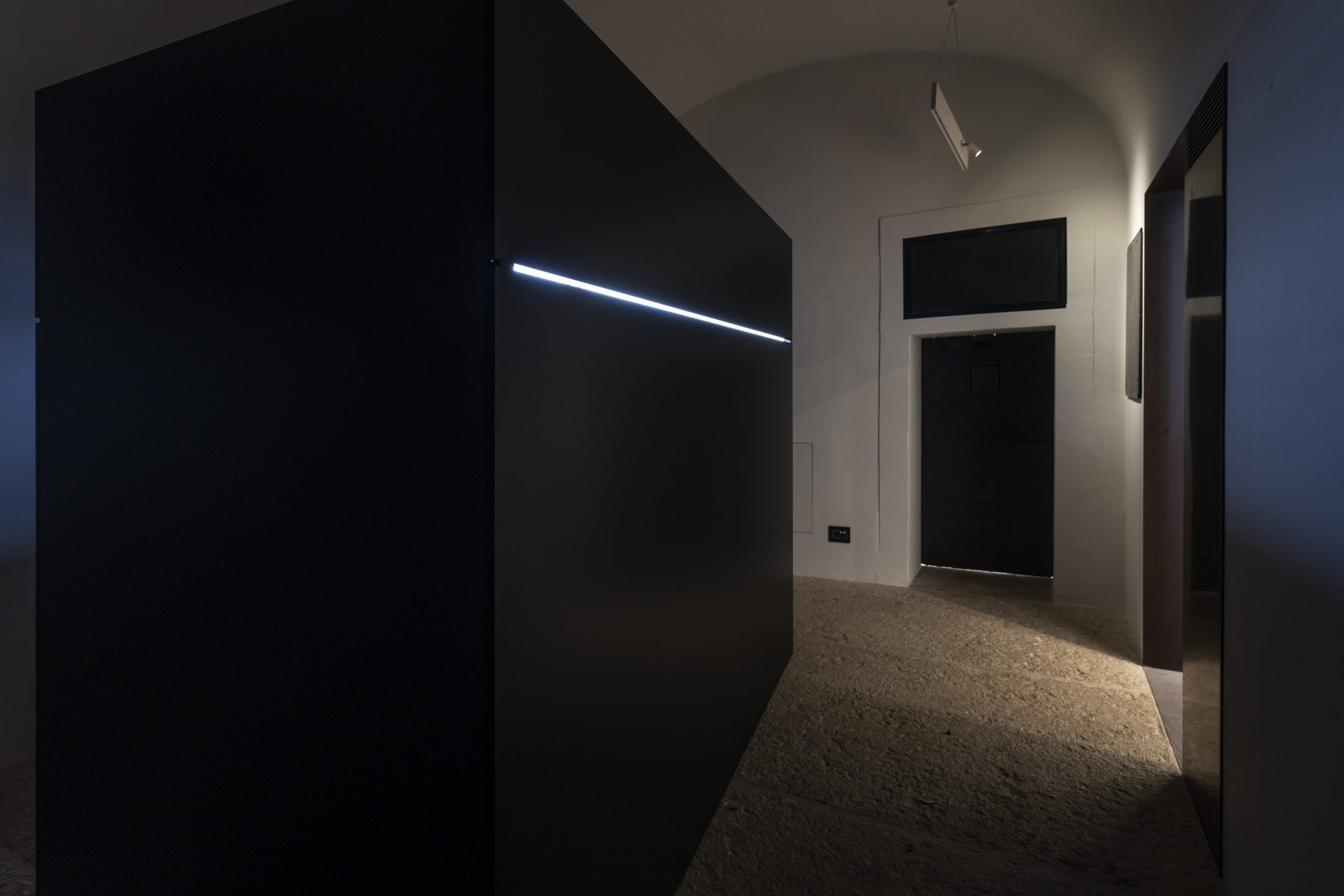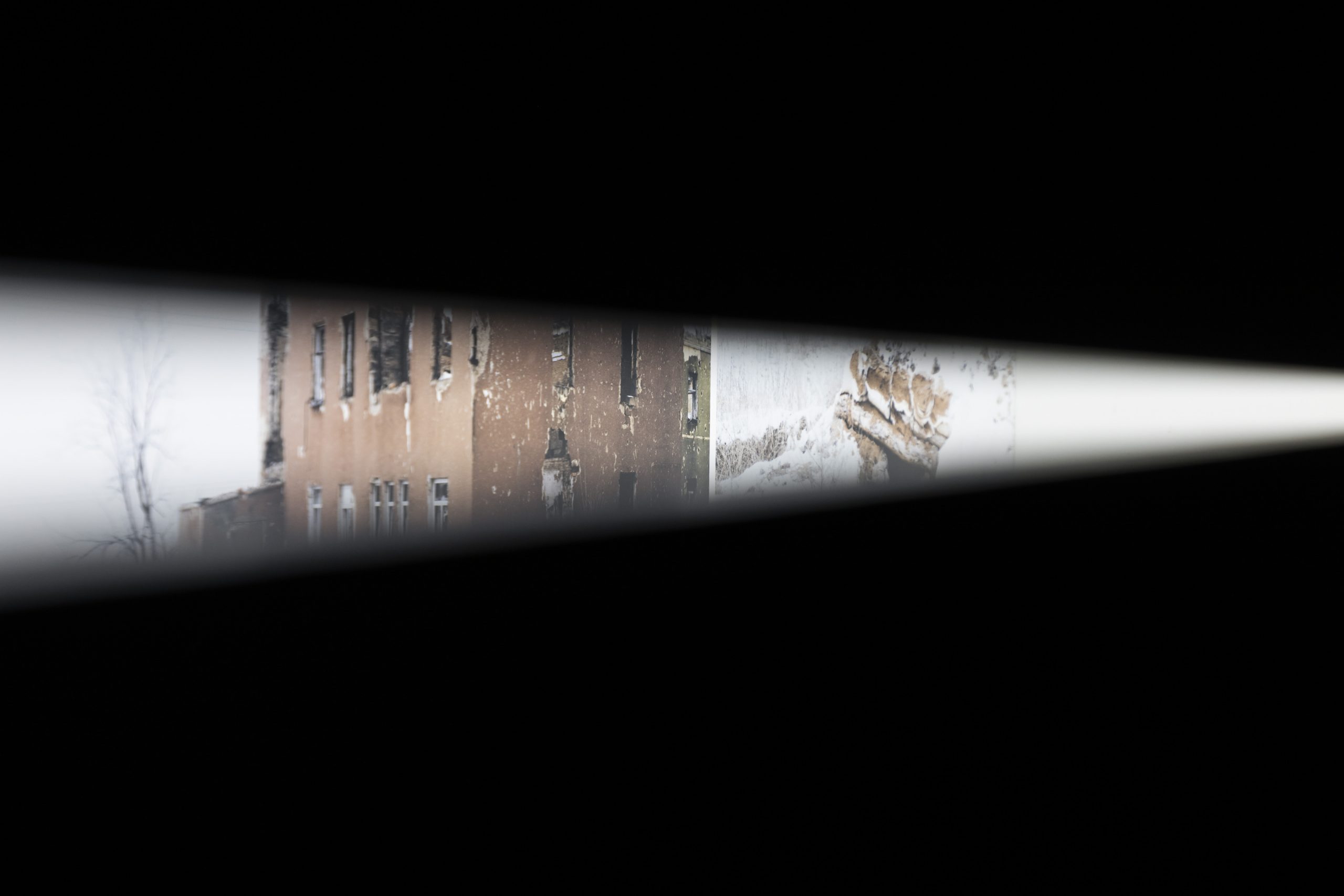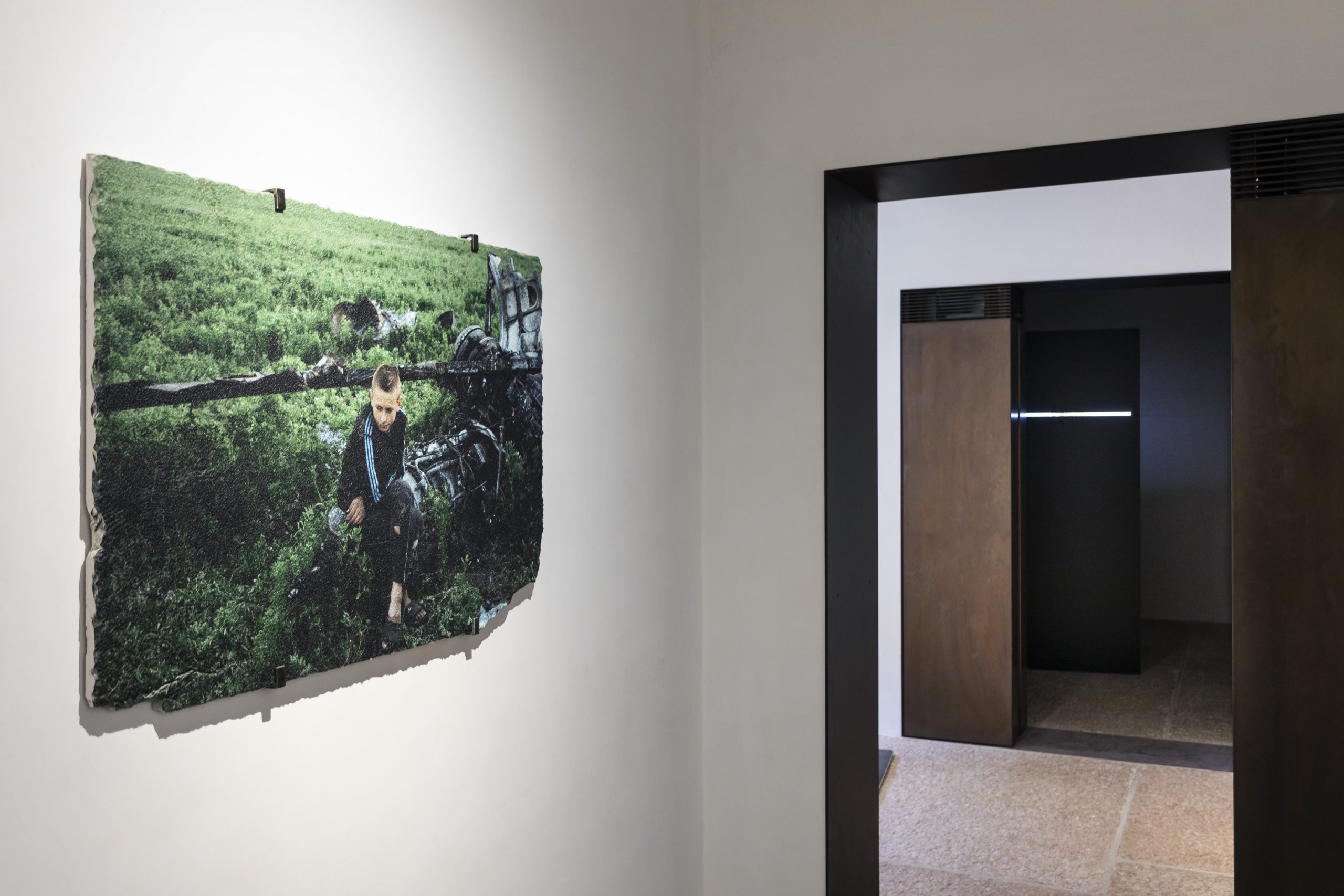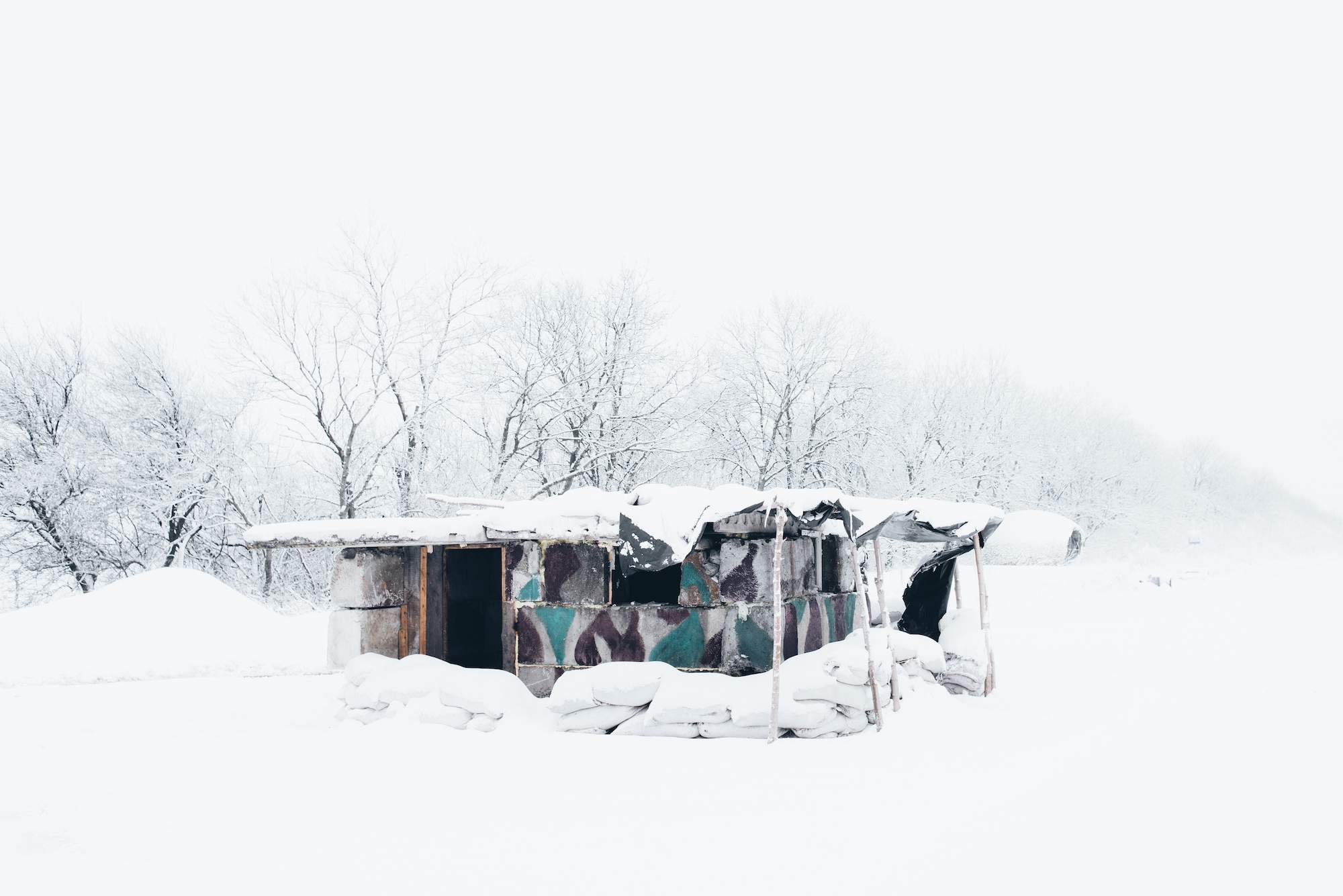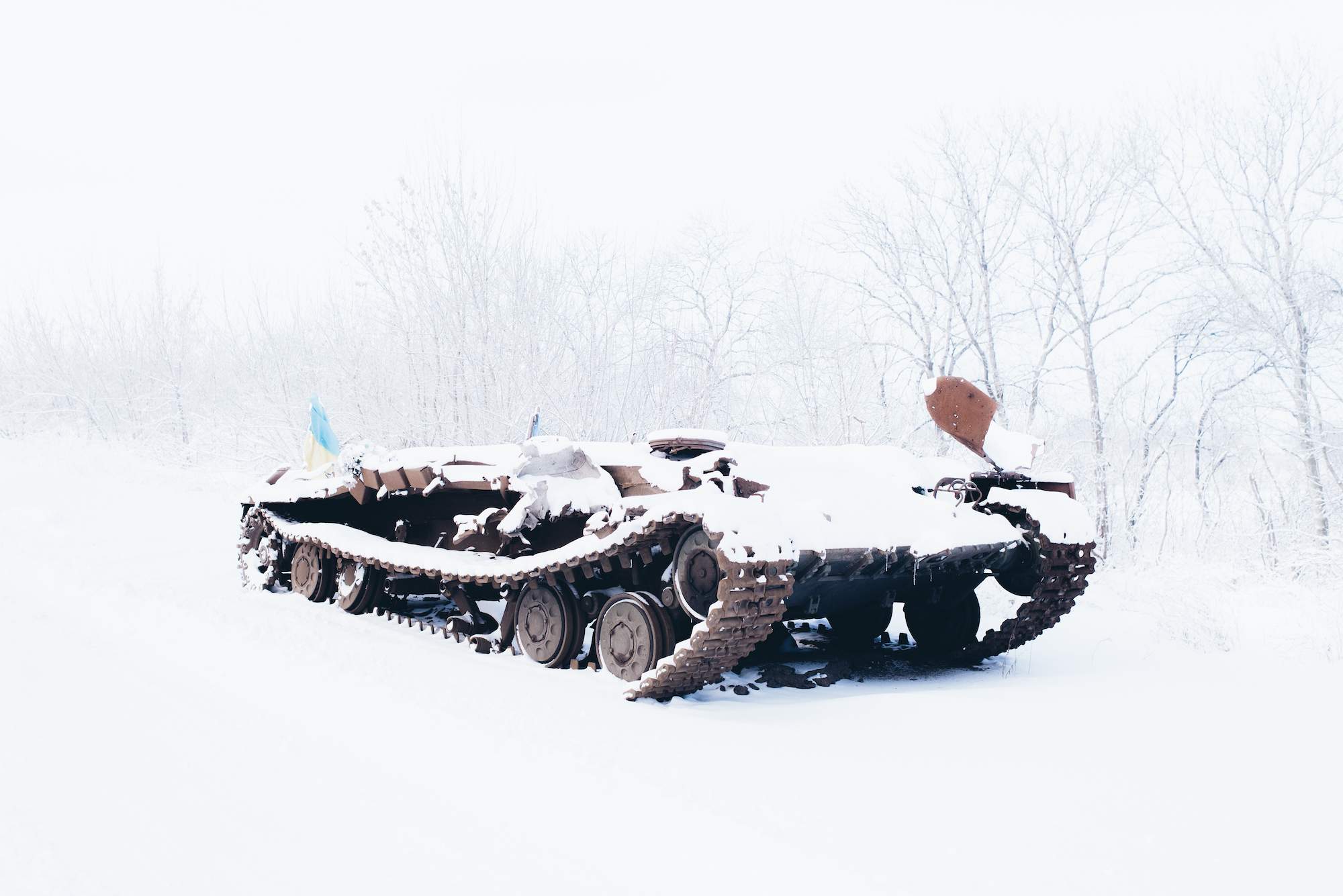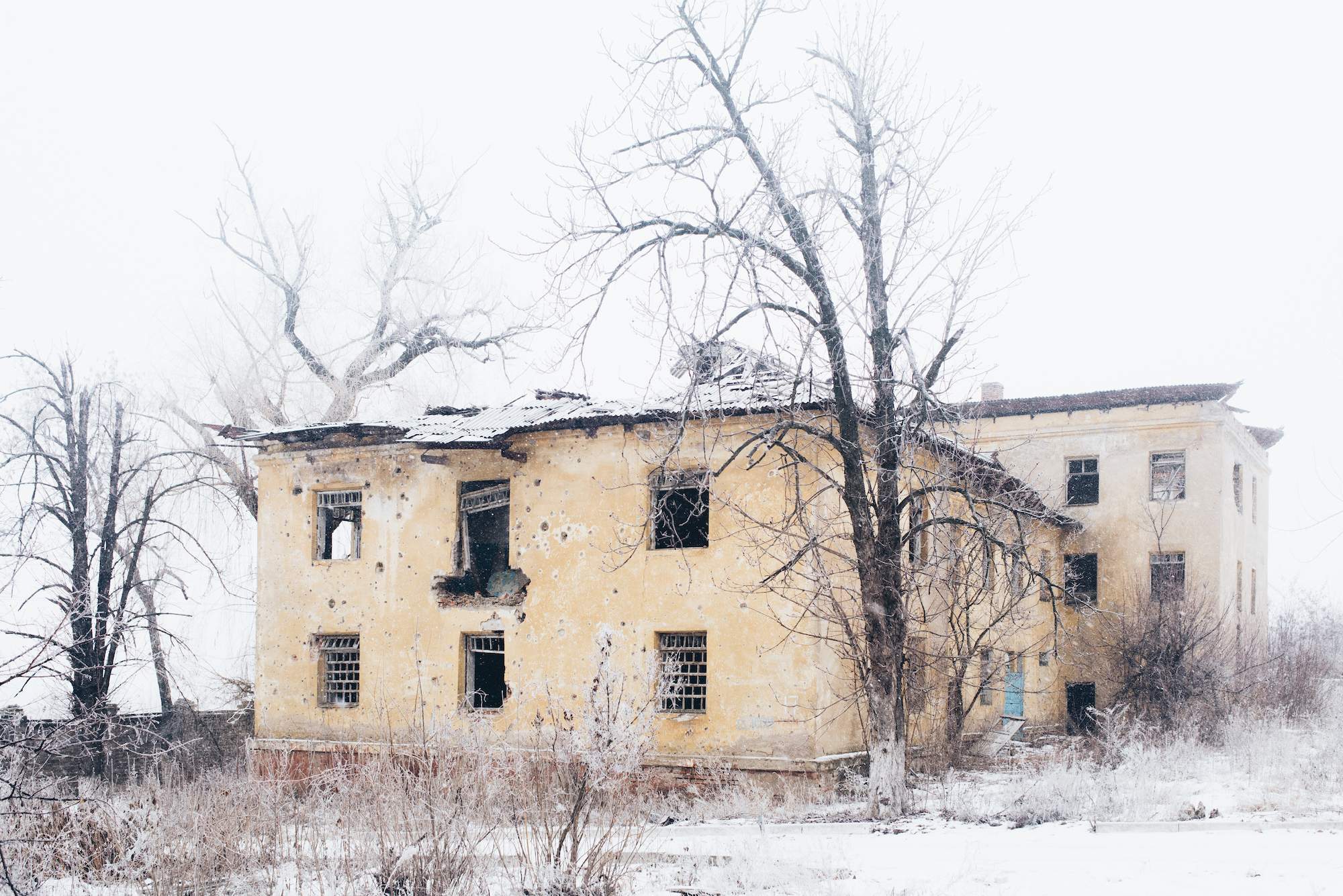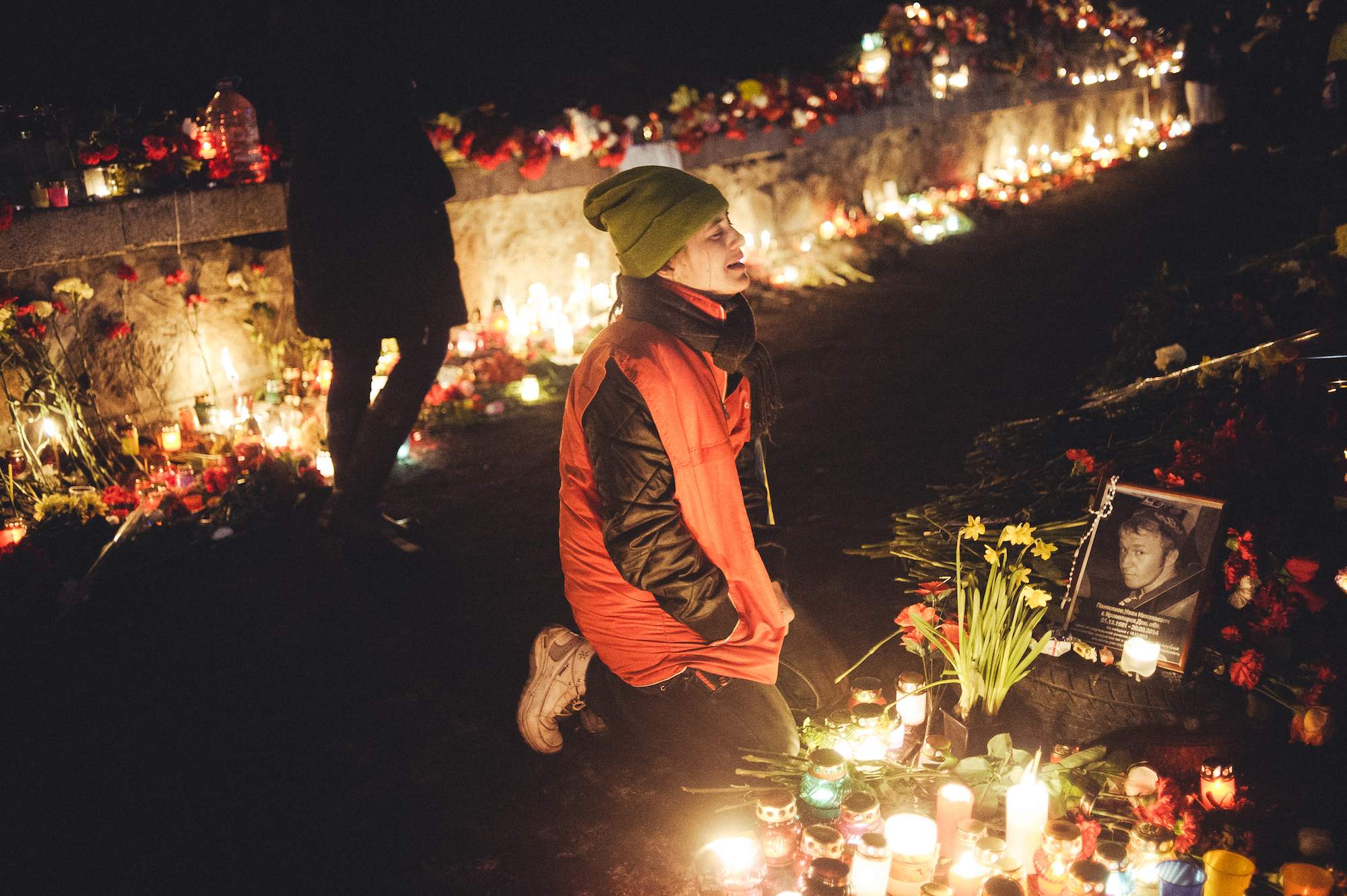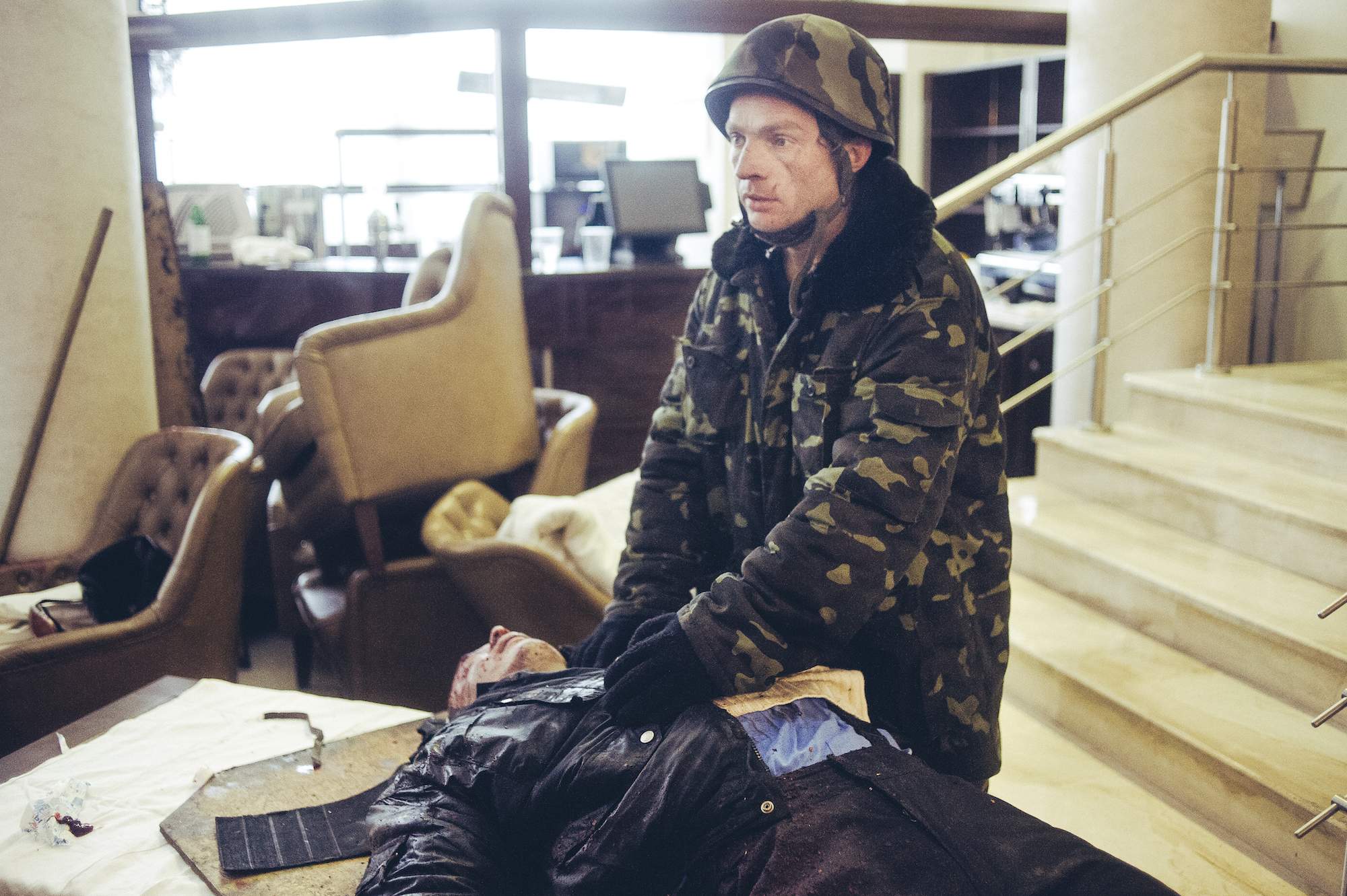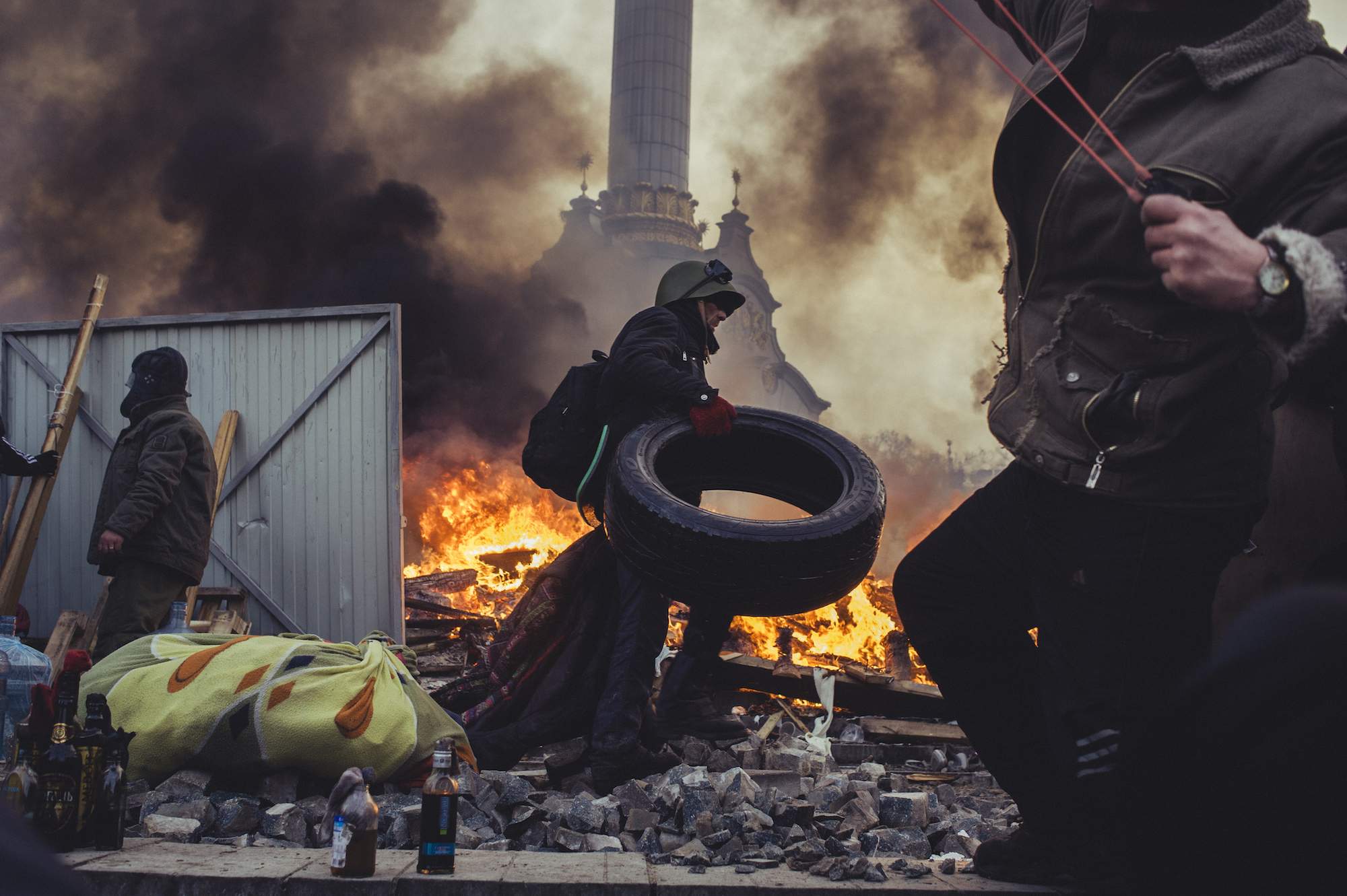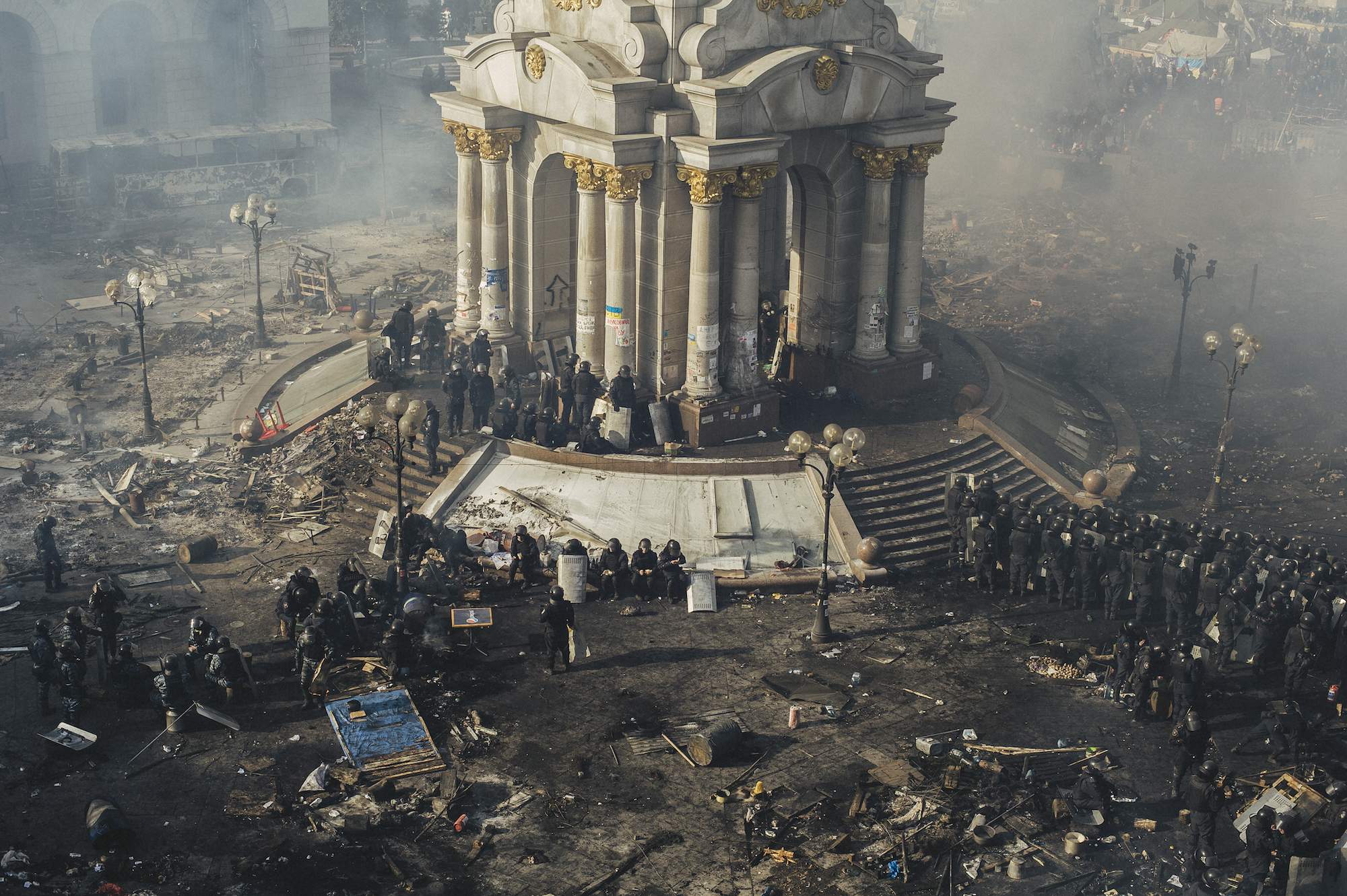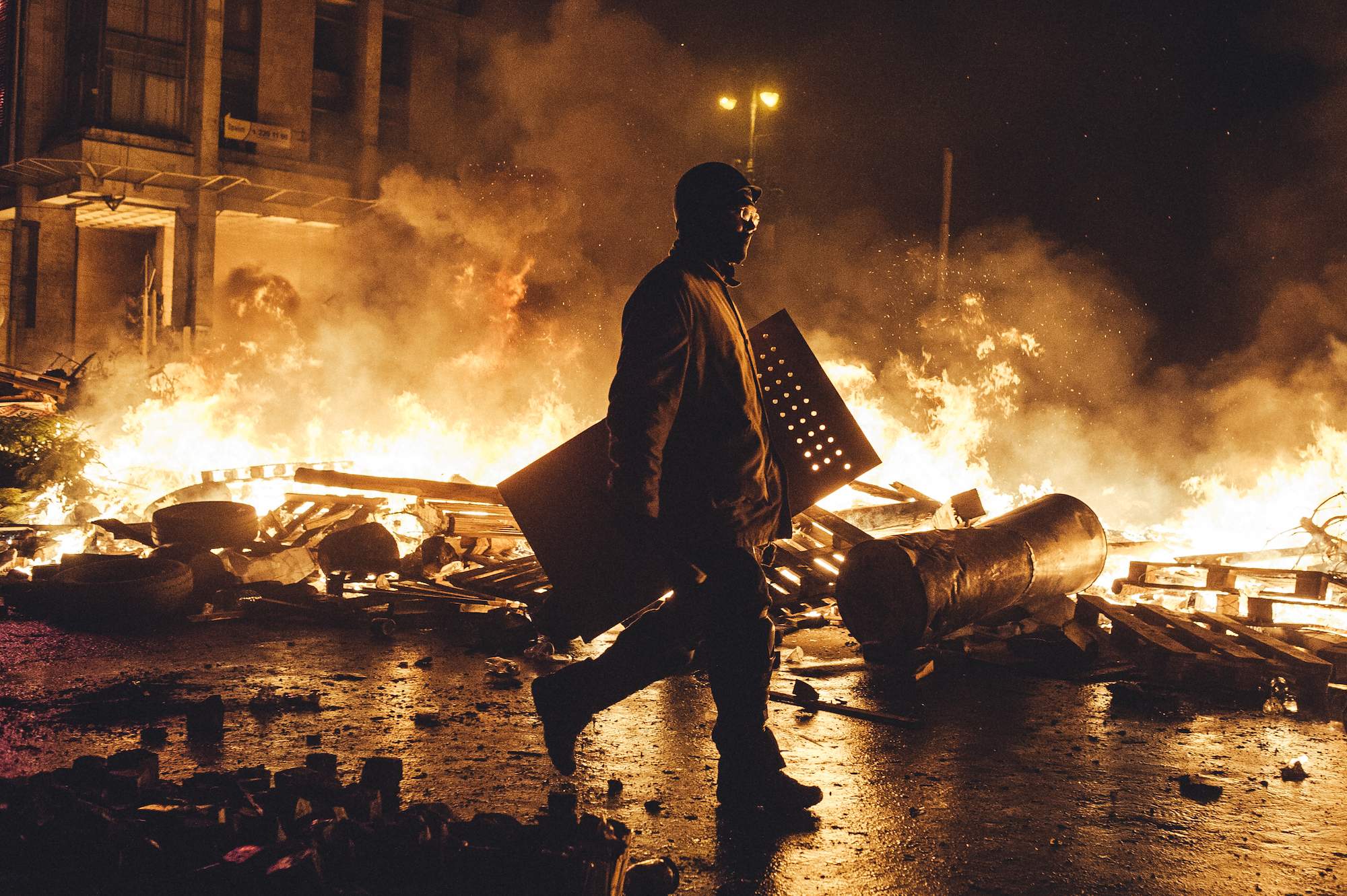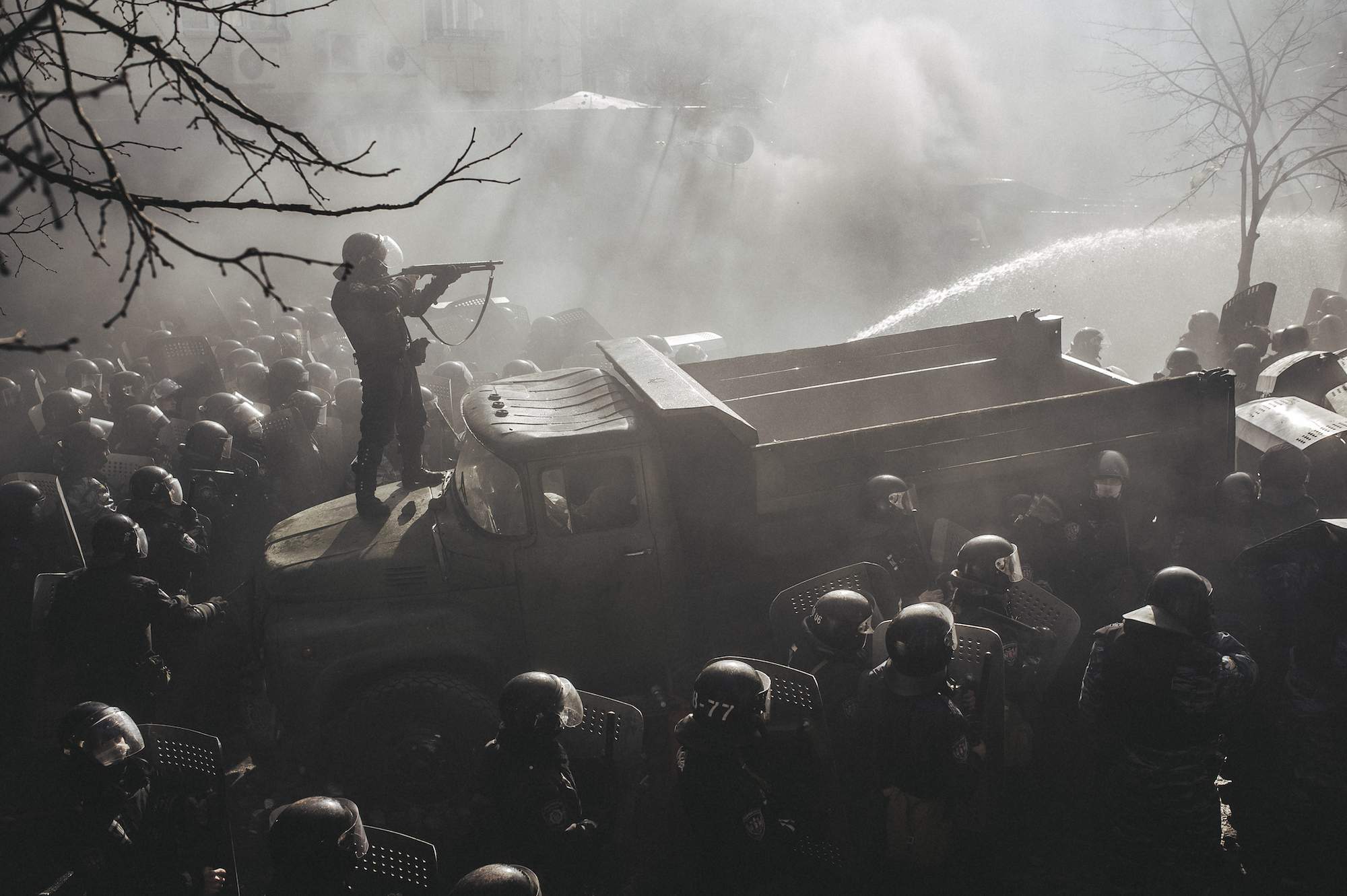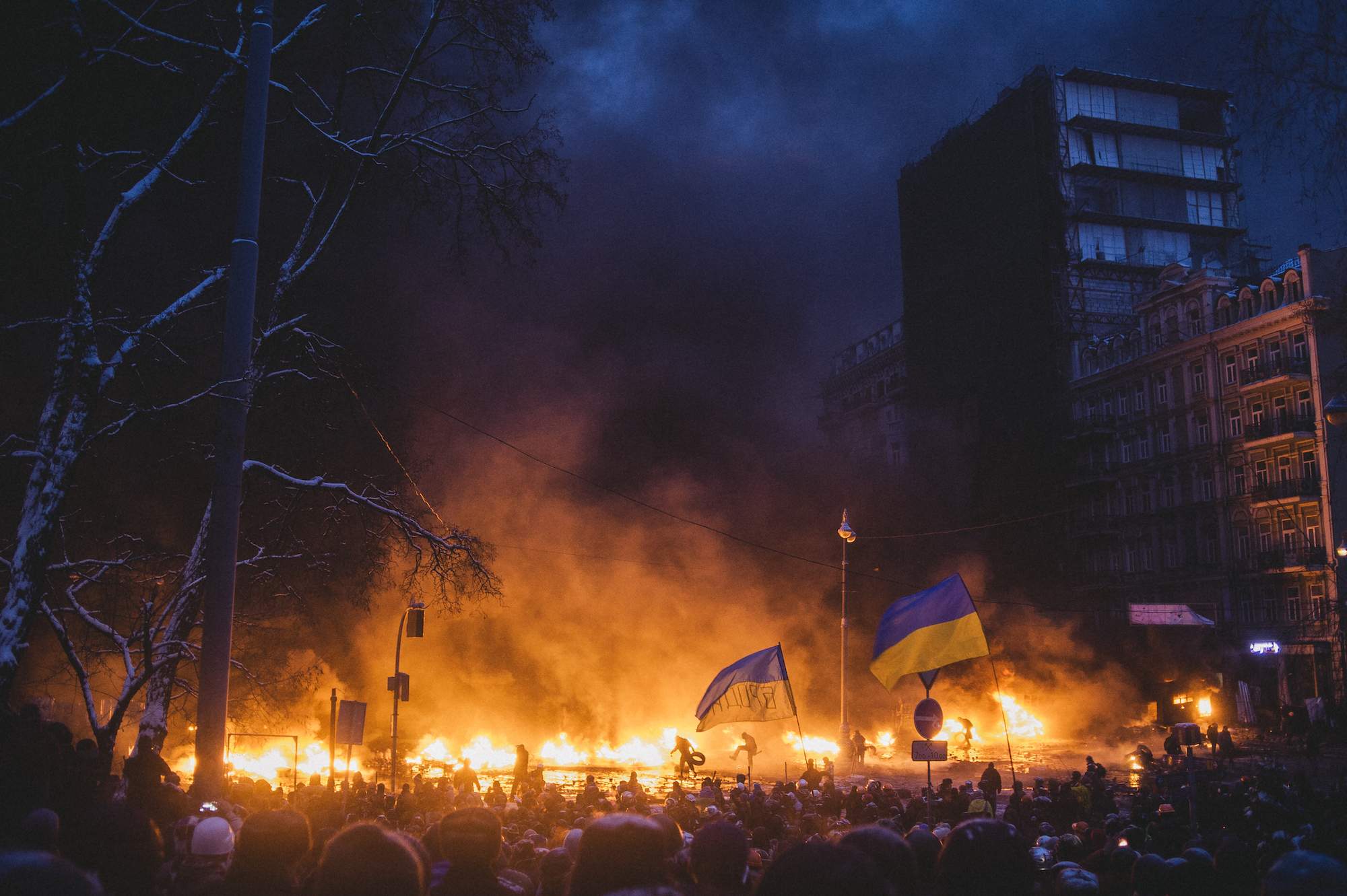
Maxim Dondyuk in conversation with Greta Cristini
How do you think your work can help people understand what Ukrainians are living right now?
If you think that your work can help somebody you sort of think too much about yourself. I just hope that my work can help understand. But for me there are two different ways of work. Sometimes I’m like one of those patriotic photographers who want to fight against the Russian propaganda, who tries to resist and show the truth, who works with magazines because understands that international media is about confrontation. And for this I try to be with soldiers. But another part of me is an artist who just doesn’t want action, who doesn’t want to go to the zero line. Sometimes I spend some time 10 kilometers from frontline and there I think about this war as nonsense and that in the future there is going to be peace anyway. It’s a really strange situation inside of me. And after one year of war, I would just want to make some artistic work. I hope that soon we will win, because I’m really tired of being on the frontline and especially to be confronted with the army who would not make access to journalists. Sometimes I can spend six weeks only for one week of shooting, so why should I do it?
Of course, I think it’s important for history, and mostly for people who are far away from Ukraine. Before this war, I really didn’t believe that the media could actually change the mind of people. But when my picture was on the cover of Time, I understood that some media still have huge power. After this, in two months I would make every evening video-interviews for TVs in Japan and America. A lot of people from different countries saw my pictures and wanted to talk with who lives here and try to understand. Also, our propaganda abroad is especially weak. So I think I can do more for my country with cameras and with Optima. If they send me in trenches I will be useless. I don’t know what I can do and I don’t want to kill anybody. I’m ready to risk my life but I’m not ready to kill another human being.
How the war changed your perception of photography?
My way of photography is not connected with the war in Ukraine. Photography for me now is not like journalism, it’s more philosophy or visual language so it changes if something changes inside of me, for instance because some situations happen etcetera. I think that my visual language changed because of my books, my philosophy, my background, but actually war also changed me. If we talk only about photography and not about visual art, before I was really inspired of some war photographers. Some media and magazines created some celebrities like Robert Capa, and how many people just died because they tried to follow this legend? And we don’t even know if this story is true. So with time, I lost respect for war photography. I try to do peaceful photography, I do not want to show or romanticize the war. Regularly I make some conversations inside of me like: should I take pictures showing brave soldiers with new American or European military technology, or about how they capture Russian people or not? Because this is also propaganda like the one during Nazi Germany. My feeling is more that I should show only mutilated Ukrainian soldiers, or destroyed buildings, so that people would see what the war means. I hate war and I want to put all my feelings in my pictures. If I had to do some pictures with soldiers inciting our young generations to go to the army and be brave, the truth is that in the end all those soldiers in the picture will also die. In 2014 I spent a lot of time with soldiers because I wanted it, but now I do it mostly only with magazines because I understand the power of international media and if I know that there is going to be a publication in some international media of course it is important. But probably those pictures will not be relevant for my book or for my exhibition.
Also, at the beginning I would just do assignments non-stop for international magazines to cover the very first months of the war. But this work is not important for me anymore. Now I take assignments with magazines only if it’s interesting for me personally. But mostly I concentrate on long stories, like living for weeks in the field hospitals or with soldiers. And in all my free time between assignments I take my camera and I travel to some liberated areas, spend a couple of days in the villages and do some landscape photography. For me these are much more strong pictures now because they are a different way of talking about war.
You worked with different magazines, especially Americans (Time, New Yorker) and German (Spiegel). Do you perceive that two different magazines aimed at two different national audience search for different ways of telling about the war from a visual perspective? Did you notice any difference on what they are looking for?
Editors never tell me how I should take pictures. If they decide they want to work with me and do not select other photographers is because they appreciate and want my style on their magazine. Also, before the 2014 revolution my photography was more oriented to journalism. For me it was important who, where, when etcetera. Now it’s only about emotions and I don’t care about the sense of the picture. That’s why I often discuss a lot with editors regarding the selection of my pictures because I rarely agree with them. For instance, now if I have to explain the situation in field hospitals I take pictures of stretches with blood on it. Because if you see the face of some dead soldiers, you can think “it’s not my friends, it’s not my family, I don’t care about this”. But if you see blood, you can imagine. And if you just lost somebody, you can imagine this could be the place where some relatives were killed, so you start to create your own story. That’s why I love pictures without main characters or with too many people where you cannot understand faces. Because I think people can create much better stories than me.
Why did you accept a non-conventional installation for your photos at the Fondazione Imago Mundi exhibition?
I just try to make art through photography and I love any new way of showing my art. Paper is good if you sell pictures, but if you make some exhibitions there are too many ways of doing it and if somebody proposes me some experiment like it happened with FIM for me it’s a next level and also a new way to see my pictures.
In your interviews, you often say that you think it’s important to show not only the tragedy in a picture, but also the metaphysical view. Why is that so relevant to you? What do you want to convey with that?
Before the war, I used to read maybe four books per month, mostly about West and East philosophy. For me philosophy is not finding answers. Rather it’s important that somebody asked the same questions that I ask myself a thousand years ago. And it’s important that philosophy doesn’t talk necessarily about the present moment, but generally. I find something similar in my pictures. We recently made an exhibition in Korea and somebody came to me and told me that the pictures from 2014 Maidan revolution looked like the French Revolution. That’s the point. In my photos I try to clean everything so that people feel something which they can relate to. If I do just some patriotic work about Ukrainian present, after a couple of years this is not going to stay interesting for people and for me either. So I try to find some main questions for the whole idea of History. It’s true that with Ukraine is a bit more difficult for me because there is still a patriotic element inside of me, but for the 2014 revolution, for instance, I didn’t care about showing who were the good ones and who the bad ones, it was just two cultures confronting each other. That’s why I covered both fronts, I stayed both with the protesters and with the police and that’s why I called the project “Culture of confrontation”.
Can you give my some examples of your pictures where you see this metaphysical aspect more evident?
My picture changed because my philosophy changed. I changed my point of view. I spent my last years in Asia meditating around 15 hours per day. I think that this world doesn’t need humans, or at least countries. Sometimes when you’re taking pictures of objects, like some artillery or destroyed trees in the forest, you may realize that we’re here temporarily. We, as a nation or as a people, are destroying our lands and our cities and the question is why? For what reason? People fight because of nationalism, because of religion, because of border. But what means border? If you know history, you know borders change many times and will change in the future. Why people should fight and protect this border? The same thought relates to my art. I know that in thousands years, no one will notice about my art. I don’t cover war because I’m patriotic, I do it for many reasons, like covering History. But we do things basically because we like doing it and for me photography is like a visual diary. If I feel something, I just take a picture and sometimes I even cannot understand it. And only after selecting pictures I try to understand and for me it’s like an inner communication with my mind. When I do it for me pictures are like a sort of meditation. I walk alone, I just prefer not to be with other photographers, I stay a couple of hours in one place, listen to the sound, look for a certain light, come back many times etcetera. So it’s like some kind of meditation and maybe it’s because in this moment humans are not important. With my work I try to destroy my own ego, as well as cutting all connections with concepts like success, money, competition, nation and religion. After war, I plan to go back to travelling, visiting other countries and I know I will be forgotten here in Ukraine. For me it’s important to document History now, but I don’t care about being a famous photographer. I just want to do what I like with my wife, have some connections with nature and also with humanity because we’re social animals. But I also want to live my life only based on the present. Because life is now.
What does your work say about the Ukrainian national fortitude or the Ukrainian nation? What’s your current thoughts about the Ukrainian people that the war made you realize? What did this war teach you about your own people?
Of course everyone was so surprised that Ukrainian men could resist Russian power. Putin made a huge mistake because he basically reunited the whole nation, he built a strong nation again. The war makes sense for us now because we necessarily have to protect our land, but we didn’t want this war. We have no choice, we just can’t evacuate 45 millions of people to Europe. I also think the answer has more to do with a nation in war than with Ukraine itself. Ours is not a unique situation and people try to extrapolate an heroic element from normal situations. Every young country if attacked or invaded would resist. A nation is like a human, it evolves. Every country fights for independence, like Germany fought with France. Now we just fight for our own independence and try to be a country not part of some other empires. And of course it’s because we are young, so if we were an old nation like Italy, maybe our mindset would have been different.
The exhibition’s title is “War is over! Peace has not yet begun”. We are more than one year into this war and you’ve been covering the Ukrainian-Russian conflict since 2014. Do you still believe in peace? After having watched so much hatred, when do you think peace will start?
In 2014 there was a revolution between two different cultures: one part of the people in Ukraine had nostalgia about the Soviet Union or Russian empire and another one wanted to be an independent country and part of European Union. Now, in my opinion it’s a huge fight between Russia and Nato (or America and Europe), although only Ukrainian people and Russian people are killed. In our country we cannot control when we can stop, we cannot decide which area we may liberate because we don’t have weapons. We have people. So America and European countries decide which weapons they send to us and this means they decide which part of the country we can liberate, not our President. It’s not an Ukrainian decision. They can say that they send us only 10 tanks and that must be enough to liberate only one city. Everybody, even soldiers, understand this. We do not ask to destroy Russia or to kill Putin, we just want to liberate our cities and villages to go back to hour hometowns. We don’t have choice. Ukrainians, and Russians as well, are exhausted. Russia believes that the fight is not against Ukraine, but against the collective West. Ukraine is a buffer zone between Russia and Europe and sometimes for me it feels likes nobody wants to finish this war as soon as possible, especially America. I’m sure if America and European Union want to stop this war, they can do it in a couple of weeks or months. I think Nato once was created also to guarantee peace in this area and we sent our nuclear weapons to Russia signing the Budapest Memorandum. At that time, Great Britain, America and Russia promised to protect us if some other countries started a war again. Why can’t we just create some systems ensuring this solution? At the end, I think this war as any other war will finish with the signing of some piece of paper. Meaning, there’s going to be a compromise anyway.
And maybe Nato wants to impose a division like between North and South Korea. But I think Ukraine’s aim is to liberate the whole occupied area.
Interview was conducted on 12th March 2023
PHOTO CREDITS
1.
Maxim Dondyuk, from the series Culture of Confrontation, 2013-14
2.
Maxim Dondyuk, from the series Ukraine’22, 2023
3.
Installation view War is over! Peace has not yet begun, 2023, Fondazione Imago Mundi, Ph. Marco Pavan.
4.
Maxim Dondyuk, from the series Between Life and Death, 2017
5.
Maxim Dondyuk, from the series Culture of Confrontation, 2013-14






















